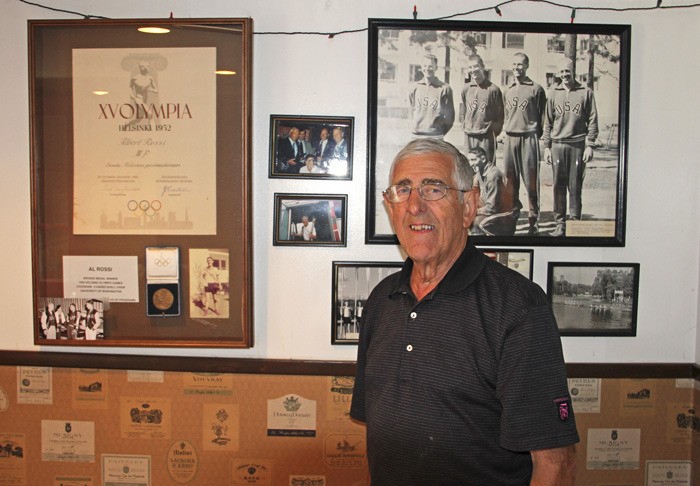Al Rossi has clear memories of the 1952 Helsinki Olympics.
“It doesn’t go away,” said the 81-year-old Auburn man. “Here we are 60 years later, and you’re asking me about the Olympics. It lingers.”
And if the memories ever begin to get hazy for Rossi, all he has to do is turn to the pictures and mementos lining the walls of his basement. Especially the frame containing the bronze medal he won as a coxswain on the U.S. four-man rowing team.
EARLY DAYS
Rossi’s family moved to Auburn from Michigan when he was in the sixth grade.
“There was 5,000 people when I moved here, now there is 80,000,” he said. “I was here when we only had two stoplights.”
He attended Auburn High School, where he was active as a team manager and cheerleader.
“I was too small for sports,” Rossi said. “At the time I was 5 feet, 2 inches and about 105 pounds.”
After graduating in 1949, Rossi enrolled at the University of Washington as a business education major. It’s where he found his role on the Husky rowing team.
“You have to be small to be coxswain,” he said. “And I was.
“The main job of a coxswain is to steer the boat,” Rossi explained. “You sit back in the stern and you have tiller ropes. You steer every once awhile, just making little corrections to have the straightest line to the finish. Because every time you have to move that tiller it’s like putting the brakes on.”
In addition to steering, the coxswain is part motivator, part coach.
“You energize them, you tell them where you are in relation to the other crews,” Rossi said. “In the last part of the race you tell them to up the stroke. You’re kind of the main motivator and coach on the water. You help with technical stuff, like somebody’s oar is in the water a split second later and you tell them ‘bow, you’re late.’”
Then, as now, the Husky rowing teams were national powerhouses, winning several Intercollegiate Rowing Association championships under coach Al Ulbrickson.
In 1952, Rossi – then a junior – was a member of the school’s junior varsity team coming into the IRA national championships and Olympic trials. Just a couple of weeks before the event, Rossi said, Coach Ulbrickson was dissatisfied with the performance of his varsity four-man, plus coxswain team and shuffled the deck, putting Rossi in the stern with a mix of varsity and junior varsity rowers.
The combination of Carl Lovsted, Al Ulbrickson (the coach’s son), Richard Wahlstrom, Matt Leanderson and Rossi proved to be the right recipe.
“We just kind of clicked,” he said.
ONTO THE GAMES
The team captured the national championship, qualifying for a spot in the 1952 Olympics in Helsinki, Finland.
On July 19 Rossi, his crew and the rest of Team USA walked into the Helsinki Olympic Stadium for the opening ceremonies.
“It’s nothing like they do now,” Rossi said. “They spent $40 million for opening ceremonies (in London). They probably spent a couple thousand bucks (at Helsinki). They had a couple speakers who welcomed everybody. But the substance was the same, we were all lined up in a stadium, with our flags and our uniforms. And then they had an Olympic toast and we went on from there.”
Rossi and his crew qualified for the finals, where they placed third, finishing with a time of 7 minutes, 37 seconds.
“We barely missed out on the silver medal,” Rossi said.
Switzerland edged the U.S. with a 7:36.5 finish. Czechoslovakia won the gold with a time of 7:33.4.
Rossi said the Olympic experience wasn’t really about the competition.
“Meeting all the other people was the substance. It was about the harmony,” he said. “We keep track of who wins what, of all the gold medals, but that’s not it. It doesn’t matter. What matters is the sportsmanship and integrity and honesty. It’s about sharing togetherness. You get to know your neighbors, whoever they may be.
“It’s really a platform to show the world how we can all get together. It’s just on the field of play,” he said. “Nobody wins the Olympics. Individuals are just honored for their efforts.”
RETURNING HOME
After the games Rossi returned to the UW, where he graduated in 1953. He embarked on a career as a teacher and administrator with the Seattle School District. In 1959, he married Sharimae Rossi.
After retiring from the school district in 1982, he worked full-time at the Longacres Thoroughbred racetrack as the director of programs and printing until 1995.
Now he keeps himself busy puttering around the house, managing his rentals, and in the winter, working for the Pac-12 evaluating basketball officials at Husky games.
Sixty years and 15 Olympiads later, Rossi said he would jump at the chance to do it all again.
“Then I’d know more about the significance and emotion,” Rossi said. “When you’re 20 years old, you leave Auburn and all of sudden you’re in the stadium at the Olympics. It isn’t until you wake up when you’re home that you understand what it’s all about.
“It was a wonderful experience … just to be over there and part of that whole scene. You don’t realize how important it is until you’re out of it.”


